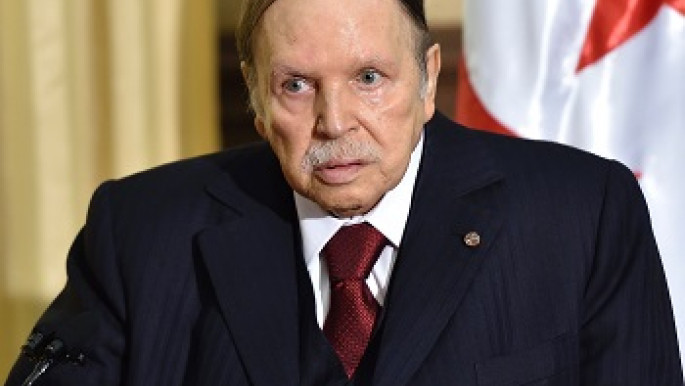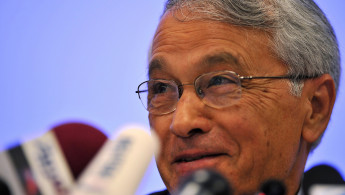Will Chakib Khelil replace Bouteflika as Algerian president?
Will Chakib Khelil replace Bouteflika as Algerian president?
Analysis: As President Bouteflika's health deteriorates, the establishment is worried he may not be able to serve the remainder of his term. The former energy minister could be one replacement.
5 min read
Chakib Khelil: The favoured successor, or an establishment ruse? [AFP]
The ruling establishment in Algeria is working to finalise arrangements for the succession to ailing President Abdelaziz Bouteflika, who is thought unlikely to be able to serve out the remainder of his term, which ends in 2019.
All signs suggest the interest groups in control of power in Algeria are in the process of agreeing a certain political formula that would be put in place post-Bouteflika. At the heart of this sits former energy Minister Chakib Khelil.
Khelil recently returned to the country to play a major new political role. But suspicions of corruption surrounding his name since March 2013 as well as constitutional obstacles could force the authorities to look for creative ways to push him through.
Khelil has not hidden his political ambitions since his return in March. At the time, he said he was willing to assume any official post "to serve Algeria" and share his experience in such a regard.
In truth, Khelil enjoys the full trust of Bouteflika's circle, who feel they can entrust him with the political legacy of the sitting president and the preservation of their interests.
It is thought Bouteflika's deteriorating health has increased the concerns of the ruling echelons, forcing them to begin preparations in earnest for a smooth transition of power into the hands of a "trustworthy clique" if needed.
On April 24, the Algerian president's office said in a statement Bouteflika underwent "routine medical checkups" in Geneva, before he returned on 29 April.
All signs suggest the interest groups in control of power in Algeria are in the process of agreeing a certain political formula that would be put in place post-Bouteflika. At the heart of this sits former energy Minister Chakib Khelil.
Khelil recently returned to the country to play a major new political role. But suspicions of corruption surrounding his name since March 2013 as well as constitutional obstacles could force the authorities to look for creative ways to push him through.
Khelil has not hidden his political ambitions since his return in March. At the time, he said he was willing to assume any official post "to serve Algeria" and share his experience in such a regard.
In truth, Khelil enjoys the full trust of Bouteflika's circle, who feel they can entrust him with the political legacy of the sitting president and the preservation of their interests.
It is thought Bouteflika's deteriorating health has increased the concerns of the ruling echelons, forcing them to begin preparations in earnest for a smooth transition of power into the hands of a "trustworthy clique" if needed.
On April 24, the Algerian president's office said in a statement Bouteflika underwent "routine medical checkups" in Geneva, before he returned on 29 April.
 |
The leading entities dominating the country, namely the presidency, the army, the political establishment and the major financial interests, seem to all favour a key role for Khelil |  |
The leading forces dominating the country, namely the presidency, the army, the political establishment and the major financial interests, seem to all favour a key role for Khelil after Bouteflika is retired.
 |
| Abdelaziz Bouteflika [AFP] |
The military, whose political influence has taken a hit as a result of Bouteflika's reforms in the past five years, seems also to support Khelil.
The army command is by all accounts willing to provide logistical support to back the choices made by Bouteflika and his entourage in terms of succession arrangements.
Most observers agree Ahmed Gaid Salah, the Algerian army chief of staff, has less of an appetite for being in the limelight himself, meanwhile.
Politically, Khelil enjoys the support of the ruling party, the National Liberation Front, which controls a majority in both the government and parliament.
Amar Saadani, a former parliament speaker and NLF secretary general, and one of the closest men to Bouteflika, has often strongly defended Khelil against corruption allegations.
Interestingly, Saadani even went to war over Chakib Khelil with the powerful intelligence services and its now-sacked leader Mohamed Mediene, defending Khelil as one of "Algeria's top cadres". This position was echoed by several political parties loyal to the government.
Khelil's presence in power would help figures such as Saadani and other political entities in pre-empting the candidature of Ahmed Ouyahia, secretary-general of the National Rally of Democracy and the current chief of staff of the Algerian president.
Ouyahia is opposed by the NLF as a possible presidential candidate.
 |
Khelil has the support of the financial cartels controlling the country's economy |  |
Khelil is also working hard to secure the support of the religious establishment.
Since his return in March, he has made several visits to religious leaders, although civil society activists have often met him with protests, objecting to his alleged attempts to exploit religion for political favours and to whitewash his alleged corruption. This happened most notably in the regions of Mila, Inaya and Chlef.
 |
Khelil's return to the country and his movements greatly resembly the way Bouteflika returned in April 1998 |  |
Khelil's return to the country and his movements greatly resembly the way Bouteflika returned in April 1998.
The current president was also being chased with corruption allegations. At the time, the ruling elites relied on the religious establishment to whitewash Bouteflika's reputation, exploiting the symbolic standing it enjoyed among the Algerian people.
"All indications and the regime's needs impose a future role for Khelil," political analyst Mohamed Baghdad told The New Arab. The most likely scenario for this would "walk in the footsteps" of 1998, he added.
Baghdad said the nation's rulers may manufacture consent through bribing the population with social and economic offerings, but also through intimidation and repression - as happened in the past.
 |
Khelil is close to some US politicians and business interests, including energy firm Halliburton |  |
The regime will, however, need to make more of an effort to sell its new choice to its international partners.
But the ruling establishment benefits from Khelil's international relations, especially as he is thought to enjoy Washington's backing, given the time he spent there. Most recently, he was in the US between March 2013 and March 2016, as he evaded corruption allegations.
Khelil is close to some US politicians and business interests. A former oil engineer based in Dallas, he is said to have personally convinced energy giant Halliburton to invest in Algeria. He is also a major proponent of enlarged US-Algerian trade relations, especially in the energy sector.
Another Washington link is his Palestinian-American wife Najat Arafat, who was involved in Palestinian-Israeli peace negotiations through the so-called American Taskforce on Palestine. She was honoured in 2010 by NATO commander General James Jones, yet her links to the family of late Palestinian leader Yasser Arafat could pose a political problem, said analyst Elcheikh Ashrati.
"Pushing for Khelil could lead to open confrontations with France through its arms in Algeria, given his affiliation to Washington," he told The New Arab.
Meanwhile, Nasreddine bin Hadid, another political expert, dismissed Khelil's ascendancy as a ruse by the establishment to curb the pro-French lobby in Algeria.
"I don't believe he could be president," he told The New Arab. "But he is being used to rearrange the political landscape."
Join the conversation. Tweet to us: @the_newarab



